 I don’t like to watch television with my mother very much.
I don’t like to watch television with my mother very much.
If it’s a show she usually follows, she’ll narrate the proceedings, telling me everything she thinks I should know about the characters and storylines up to that point. Consequently, General Hospital hasn’t been as much fun in years.
Whereas if it’s a show with which she’s unfamiliar, she’ll ask me who everyone is, what their motivations are and what’s going to happen next. I’ve learned to simply stay quiet and let everything unfold for her.
The worst, however, is when she finds something so utterly predictable, she’ll guess what happens. When she’s right (which she often is), she’ll excitedly say, “I wrote this too!”
I suppose I am my mother’s son, because at points during The Cape, I said the same thing.
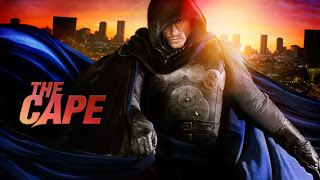
Let me get this out from the beginning. The Cape is not what anyone would consider a particularly clever, or good television program. At its worst, the show is treacly, maudlin and almost entirely lacking in subtlety. Plot points are telegraphed within the first few minutes and characters behave with a brisk inconsistency. In short, it’s a mess of a show.
But it’s an often thrilling mess, as undeniably fun as it is mindblowingly brainless. Most of the time, it recalls the syndicated adventure series of the ’90s, the Hercules, Xenas, and Vipers of that era. (Aesthetically, it most resembles Glen Larson’s Night Man, an adaptation of the Malibu Ultraverse comic of the same name.) It also harkens back to NBC’s own history of trashy, yet enjoyable action-adventure shows of the ’80s, such as The A-Team and Larson’s Knight Rider.
The Cape has a dynamic feel that’s hard to dismiss, and though it can be blockheaded, the show is self-aware in its stupidity–to a point. It has fun with itself, throwing out larger-than-life characters and insane situations, and letting the cast chow down on scenes with an admirable gusto. Yet it stops short of outright winking at the camera; the most it pokes at the fourth wall is with the fictional comic that gives the hero and the show its name.
But the best thing about The Cape–which is why we’ll be covering it regularly here at Forces of Geek–is that it does exactly what it seeks to do, which is to replicate the outsized, pulpy tone of classic superhero comics and sow the seeds of its own universe. While none of the characters have supernatural powers–not yet, anyway–the world of The Cape is replete with masked do-gooders and crimelords, mysterious data brokers, freakish outcasts, and an honest-to-God circus of crime.
In its first two hours (aired back to back), the show effectively establishes Palm City as deceptively sunny, eaten away at its core by corruption and greed. Cops are outed as crooked seemingly every day by the enigmatic blogger Orwell. (Again, no one will commend the show for its nuance.) The only honest cop seems to be our hero, Vince Faraday (David Lyons), a loving husband and doting father, who bonds with his young son Trip over their favorite comic book, The Cape.
We’re thrust into the thick of things when a new police chief is appointed to head the Palm City Police Department. The new top cop is set to deliver a speech, presumably on how the city needs to stay strong in the face of adversity, never lose sight of his integrity, and all that. Being the sole honest cop in Palm City, Vince is naturally tapped to lead the new chief’s security detail. Unfortunately, Chess manages to get close to the chief and murders him.
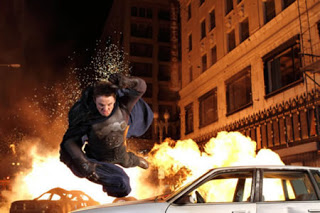
Disheartened by the killing of the chief on his watch and the corruption gripping the force, Vince is convinced by his best friend and partner Marty to join the private police force of the Ark Corporation. We see shades of OCP here, as Ark plays the part of benevolent megacorporation, headed by billionaire Peter Fleming (24’s James Frain, stopping just short of mustache-twirling). Vince is swayed by Fleming’s plans to clean up the city, and is hired immediately after their first meeting.
Before he has a chance to enjoy his new gig, Vince is contacted by Orwell, who tips him off to a shipment of superexplosive being picked up, the same explosive used by Chess to kill the police chief. Vince asks Marty along to help him investigate, but wouldn’t you know it, Marty sets Vince up and reveals himself to be working for Chess, who turns out to be…Peter Fleming.
See, I wrote this too.
Fleming, of course, needs a scapegoat, so he staples his mask to Vince’s head and frames him for his crimes. On the run from cops and Ark officers, Vince is “outed” as Chess on television and chased through a railyard. Before he can be captured, though, he is seemingly killed in an explosion, as his family watches on TV.
Vince survives, however, and is taken in by illusionist Max Malini and his Circus of Crime.
Yep, Circus of Crime.
This is the point where you’ll either love or hate this show, where it veers from mildly ridiculous over to deeply insane. Vince is able to gain Malini’s trust by allowing them to his his Ark clearance to rob banks. In return, Malini agrees to help Vince strike back at Fleming at get his family back. For a guy who initially orders his carnies to kill Vince and leave his dismembered body in the desert, he turns out to be a nice guy.
Max is so nice, in fact, that he–after some convincing–agrees to train Vince in the use of an old, but special cape, able to expand and retract apparently at a thought. The rest of the performers train Vince in combat, escape, acrobatics and hypnosis. The training montage is the most amusing scene in the pilot, as it seems everyone involved is just having fun with it all. Where else will you see a cop fight a tough-as-nails dwarf?
Once Vince is armed with the cape, he sets out to fight crime, running afoul of Scales (Vinnie Jones), whose name is a clue to his skin condition. Ultimately, Fleming tracks down the circus and kidnaps Max Malini (mostly offscreen, established through exposition, looking to extract payback for the robberies. But it’s Vince and the Cape to the rescue, leading to the Cape vs. Chess, round one, for which there is literally an act header stating this.
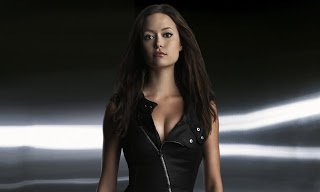
Vince makes another ally while prowling the dark alleys of Palm City, the omnipresent Orwell, who got him into all of this in the first place. In one of the pilot’s only major surprises, Orwell is revealed to be Summer Glau, and it’s immediately made clear that she’s helplessly miscast in a role that wastes her athleticism and doe-eyed vulnerability, the contrast between confused young girl and breathtaking killing machine she perfected in her most popular roles. Instead, Glau is square-pegged as a far less interesting version of Oracle, spouting exposition one moment and barking faux-tough chick castigation the next. She’s not the only flawed character–practically all of them are, but her sadly wooden performance actually gives it away in her case.
The rest of the cast is a large part of what saves the show, as a matter of fact. David Lyons has an all-American everyman look and persona, not steely enough to fully inhabit the supercop he’s implied to be, but identifiable enough as a family man desperate to regain his family. Truth be told, he’s a bit bland, but that quality makes him an excellent foil against the more vibrant supporting cast, Keith David chief among them.
Yes, the great Keith David. I would pay per view to see him read a series of children’s books on camera, just to hear his voice. That he’s a regular is one reason I’m so excited for each episode, though one of his best moments gave me a scare: having been shot trying to escape Chess, Max is found by Vince just in time to give a flowery speech on how his love for his son makes him a hero, before apparently drawing his last breath. Imagine my relief when seconds later, he opened his eyes, shocked to survive and cursing his waste of a good last soliloquy.
Max and the Circus represent a giant hole in the logic of the show, something we should get used to if we’re going to watch this every week. When they’re first introduced, the gang is utterly hostile towards Vince, especially once they realize he isn’t Chess. “We hate cops!” bellows Max. “Cops arrest people like us!” Obviously.
But once they pull off a series of robberies with Vince’s Ark card key, Max and Vince become settle into a mentor-student relationship, disregarding the fact Vince is a cop. And when it comes up again in subsequent episodes, the fact is met with nary a shrug. Creator Thomas Wheeler said in an interview that the show will explore in depth the trust issues between Vince, Max and the circus, but for now, it’s an issue frustratingly dodged.
And it’s a lot more satisfying watching them then seeing Vince’s family muddle on without him. Yes, it’s necessary to deal with their efforts in coping with losing Vince, but those scenes are frankly boring and kill the momentum the show builds. Also, Ryan Wynott, the kid who plays Trip, is pretty bland at best. There is very little chemistry between him and Lyons, which places the burden of portraying this bond solely on the elder actor’s shoulders. He tries, but it isn’t always believable. The scene where Vince appears to Trip as the Cape in order to console him should be touching, but it fell short of that for me.
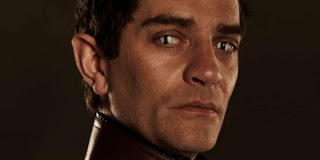
And yet, I had fun watching the pilot. Did I enjoy the following episode as much? Not really, but there were parts of it to like. For one thing, Vinnie Jones was added as a regular (even though he hasn’t appeared again, although the title of the fourth episode–“Scales”–seems to imply he may pop up). Secondly, Vince and Max’s relationship is tested for what I’m sure will be the first of many times. And what’s more, Summer Glau gets into the action.
“Tarot” sees Chess attempt to assassinate Patrick Portman, Palm City’s secretary of prisons (guest star Richard Schiff), as Portman is the one man trying to block his acquisition of the prison system. Vince raids Fleming’s penthouse in order to discover his plans, but an assassin named Cain ambushes and poisons him. He is rescued by Orwell and returned to the carnival, where Max fashions an antidote for the poison. When Vince comes around, however, Max confiscates the cape and tells him he’s too desperate and too angry to continue his quest. Vince storms off, determined to stand on his own. He discovers his own lair, scrounges for materials, computers, furniture and such, and makes it look like home. He also decides he needs a mask, to which I say (along with everyone else watching), “About time.”
I liked watching Vince find his own way, and I actually enjoyed seeing Orwell get involved in the action. She encoutners Cain a few times during the episode, and the last one gets pretty physical, interrupted when Vince arrives, having earned the Cape in Max’s eyes, to save her and Portman from the assassin.
What I enjoyed most about the episode were the world-building touches: Cain isn’t a lone killer, but a member of a secret society called the Tarot, and I’m sure the whole group is in Fleming’s employ. And a shared flashback between Vince and Dana revealed he has a secret past rooted in his military service, meaning there’s more than meets the eye to this square-jawed caped crusader Dana took a big step as well, getting a job as a Palm City public defender (obviously to give the wrongfully accused the chance Vince never received).
Sure, the second episode had some of the same flaws as the first (middling to painful dialogue, a couple stupid touches, such as Orwell pretty much dumping Vince on Max’s doorstep then peeling out, plus the usual predictability), but by that point, I was able to look past the flaws and recognize it as solid superhero entertainment. I was worried, though, that it would settle into a formula consisting of Chess sending a villain after the Cape and the Cape fighting back. The third episode subverted those fears by introducing another archvillain for Vince: Gregor Molotov, the previous wearer of the cape.
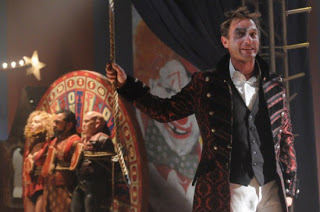
Molotov was also a student of Max’s, and inherited the mantle of “Kozmo the Unkillable” from the elder illusionist. He returns to Palm City after serving 20 years in a Russian prison, and immediately begins to press Max for the location of his beloved cape. Vince, however, has no intention of giving it up, especially to a murderer like Molotov.
Gregor Molotov becomes the best addition yet to the Cape “mythos,” becoming a sort of Bullseye to the Cape’s Daredevil (yes, the Cape ostensibly resembles Batman, but his rogues gallery looks more like Matt Murdock’s). He escapes prison by having shaped one of his teeth into a key, and in another scene, he kills three men using playing cards as throwing knives. Yet as murderous as he is, Gregor realizes he is a monster, and even shows some signs of regretting it. He’s what the hero always needs: the mirror image he needs to face. It’s good, then, to see him survive the final showdown with Vince in the end, as he is far too charismatic and chilling to write out for good.
The other major development in the third episode is the implication that Orwell is actually Chess’ daughter, a revelation telegraphed at the start of the episode with a scene wherein Fleming inquires as to the search for his daughter. Ark troops force the blogger out of her hideout, and she’s forced to crash with Vince, ultimately joining the circus by episode’s end. It does give us a chance to glimpse Summer Glau being acrobatic, if only for a moment.
After three episodes, there’s definitely potential. There’s a loopy propulsion that keeps the proceedings light and the plot moving no matter how inane or strange. Most of the cast seems to be having fun, and the world of the Cape has the potential to be pretty engaging. I’m curious to learn about the Tarot, Orwell’s origin, and the legacy of Kozmo the Unkillable. That’s the best thing I can say about The Cape–it’s an engaging, entertaining diversion, whether I can see it coming or not.
It’s one show I actually don’t mind watching with my mother. Or all of you.
F13’s rating: 3/5 (Pilot), 2.5/5 (Tarot), 3.5/5 (Kozmo)










































































































